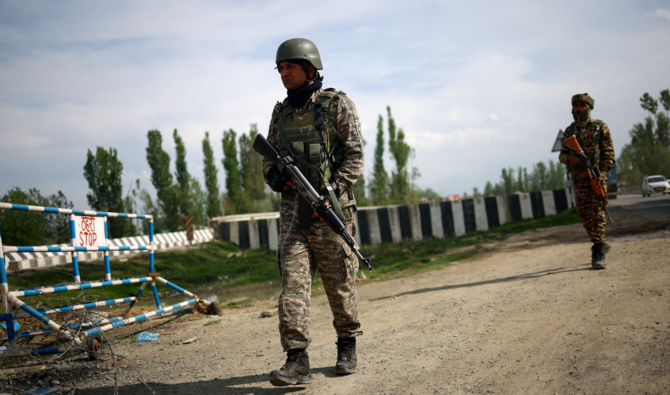ISLAMABAD: Pakistan said on Wednesday it was “concerned” after 26 people were gunned down at a tourist site in Indian-administered Kashmir in the region’s deadliest attack on non-combatants in decades, with New Delhi vowing a “loud and clear” response.
The shooting occurred Tuesday afternoon in Pahalgam, a popular resort town in the Anantnag district, where armed men emerged from forest cover and opened fire on crowds of mostly domestic tourists. A little-known militant group, the “Kashmir Resistance,” claimed responsibility for the attack in a social media message, saying more than 85,000 “outsiders” had been settled in the region after arriving as tourists, vowing violence against such settlers.
Kashmir is divided between India and Pakistan since 1947, which they both claim fully but rule in part, and has been plagued by years of insurgent violence that New Delhi says is supported by Islamabad. Pakistan denies the accusations, saying it only provides diplomatic support to Kashmiris in their struggle for self-determination.
Such attacks have historically strained ties between India and Pakistan. In 2019, a suicide bombing in Pulwama killed 40 Indian paramilitary personnel and triggered cross-border air strikes, pushing the neighbors to the brink of war.
“We are concerned at the loss of tourists’ lives in an attack in Anantnag district,” the Pakistani foreign office said in a statement. “We extend our condolences to the near ones of the deceased and wish the injured a speedy recovery.”
Indian Prime Minister Narendra Modi, who cut short a state visit to Saudi Arabia after the attack, called it an “heinous act” and pledged justice against the perpetrators.
“Those responsible and behind such an act will very soon hear our response, loud and clear,” Indian Defense Minister Rajnath Singh said in a speech in New Delhi on Wednesday.
“We won’t just reach those people who carried out the attack. We will also reach out to those who planned this from behind the scenes on our land,” he said in what was widely seen as a veiled reference to Pakistan.
“India’s government will take every step that may be necessary and appropriate,” he added.
On Wednesday, India’s army also reported killing two gunmen in a separate incident near the Line of Control, the de facto border separating the Pakistani and Indian sides of Kashmir, in Baramulla district, describing it as a foiled infiltration attempt.
A violent separatist insurgency has simmered in the Indian-administered part of Kashmir since the late 1980s, although militant violence had declined in recent years.
PARTITION AND ACCESSION
After partition of the subcontinent in 1947, Kashmir was expected to go to Pakistan, as other Muslim majority regions did. Its Hindu ruler wanted to stay independent but, faced with an invasion by Muslim tribesmen from Pakistan, acceded to India in October 1947 in return for help against the invaders.
GEOGRAPHY AND DEMOGRAPHICS
Kashmir ended up divided among Hindu-majority India, which governs the Kashmir Valley, Jammu, and Ladakh; Muslim-majority Pakistan, which controls Azad Kashmir (“Free Kashmir“) and the Northern Areas, and China, which holds Aksai Chin.
Indian-administered Kashmir has a population of around 7 million, of whom nearly 70 percent are Muslim.
ARTICLE 370
This provision of the Indian constitution which provided for partial autonomy for Jammu & Kashmir was drafted in 1947 by the then prime minister of the state, Sheikh Abdullah, and accepted by India’s first prime minister Jawaharlal Nehru. Although intended as temporary, it was included in India’s Constitution in 1949 by the constituent assembly.
REVOKING OF SPECIAL STATUS
In August 2019, Prime Minister Narendra Modi’s government revoked Kashmir’s semi-autonomous status in a move it said would better integrate the region with the rest of the country. The state was reorganized into two federally administered union territories- Jammu and Kashmir, and Ladakh. Pakistan strongly objected, downgrading diplomatic ties with India and cutting off trade.
WARS AND MILITARY STANDOFFS
India and Pakistan have fought three wars since independence, two of them over Kashmir, in 1947 and 1965. A third in 1971 led to the creation of Bangladesh. In 1999, the they clashed again in the Kargil region in what was described as an undeclared war. A UN-brokered ceasefire line, the Line of Control, now divides the region.
THE INSURGENCY
Many Muslims in Indian Kashmir have long resented what they see as heavy-handed rule by India. In 1989, an insurgency by Muslim separatists began. India poured troops into the region and tens of thousands of people have been killed.
India accuses Pakistan of arming and training militants, which Islamabad denies, saying it offers only moral and diplomatic support.
RECENT YEARS
Modi says his 2019 decision brought normalcy to Kashmir after decades of bloodshed. Violence has tapered off in recent years, according to Indian officials, with fewer large-scale attacks and rising tourist arrivals. Targeted killings of civilians and security forces, however, continued to be reported.
2024 ELECTIONS
In 2024, Jammu and Kashmir held its first local elections since the 2019 revocation of autonomy. Several newly elected lawmakers urged a partial restoration of Article 370. Key regional parties had boycotted or criticized the polls, saying the winners would not get any real political power.
With inputs from Reuters
















